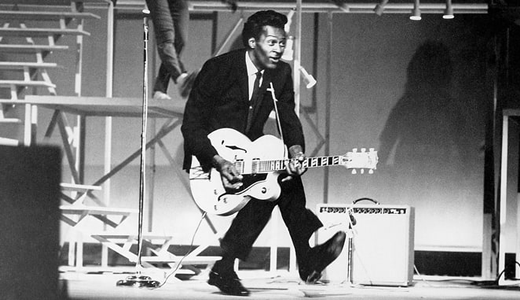It’s been said that rock is dead. While that subjective statement is impossible to prove, what’s certain is that the man often named “the father of rock ‘n’ roll” has himself passed away.
Chuck Berry died on Saturday of natural causes at his suburban St. Louis home at the age of 90. And the case can be made—and is being made strongly this week—that Berry might just be the most influential musician in American history when it comes to the genre he’s so often credited with siring.
Berry’s early, mid-50s hits—”Johnny B. Goode,” “Roll Over Beethoven,” “Rock and Roll Music” and “Maybelline,” among many others—forged a fusion of styles that would become the blueprint for rock guitar. Writing for The Atlantic, David A. Graham said of that musical alchemy,
Berry invented the sound of rock ’n’ roll guitar. You won’t find much more than the three chords that form the basis of blues and country in Berry’s oeuvre, and you won’t miss the others. Playing on semi-hollow-body Gibson guitars, Berry created a sound that drew on Charlie Christian’s clean swing, Muddy Waters’s overdrive, and T-Bone Walker’s two-string bends. The result was a sound that was unmistakably bluesy, but just as clearly not the blues, lending itself to punchy, concise solos that remain the foundation of rock guitar.
Berry’s signature approach to the new hybrid genre influenced virtually every major rock act in the decades to follow. The Beatles, the Rolling Stones, the Beach Boys, the Grateful Dead and AC/DC all covered his songs (among myriad other acts since) and were shaped by Berry’s sonic template.
But it wasn’t just his guitar playing that drew—and continues to draw—rave reviews. Writing for The Huffington Post, Butch Warner notes, “He may have been the most influential songwriter ever. … You can scrutinize the lyrics to virtually any of his songs, and you will be hard-pressed to find a bad line or rhyme anywhere.”
In the wake of Berry’s passing, surviving rock icons have echoed those sentiments on social media. “He was one of rock ‘n’ roll’s greatest poets,” said Paul McCarthy. The Beach Boys’ Brian Wilson said, “He taught me how to write rock & roll melodies, the way the vocals should go.”
Rolling Stones frontman Mick Jagger tweeted, ” He lit up our teenage years, and blew life into our dreams of being musicians and performers. His lyrics shone above others & threw a strange light on the American dream. Chuck you were amazing & your music is engraved inside us forever.”
For all of that, however, Berry’s life also had a dark side. He spent time in prison after being convicted for having a consensual sexual relationship with an underage girl. Another prison sentence stemmed from tax evasion. Still another case, involving Berry’s alleged videotaping of female employees in a restaurant he owned, was settled out of court.
It’s tempting to look back on Chuck Berry through 21st-century goggles and minimize those mildly suggestive lyrics in songs that seem quaint and innocent today. But at the time, Berry was at the vanguard of the formation of the very idea of a teen culture, one separate and aloof from those stiff squares known as adults.
In his Guardian article “Chuck Berry: the Rock ‘n’ Roller Who Wrote the Soundtrack for Teen Rebellion,” British writer Richard Williams notes Berry’s role in the lives of British teens of the time:
To the generation born in Britain around the end of the second world war, his songs opened up a new world. What Little Richard and Elvis Presley suggested in sound, he portrayed in words as well: a world of freedom and pleasure, in which adults no longer set the whole agenda.
So perhaps even more so than the sound he pioneered, Berry’s swaggering musical embodiment of the ideas of freedom and pleasure may be his deeper cultural legacy. Berry’s talented acolytes, who formed the very foundation of youth culture from the early ’60s on, reinforced those values with a vengeance—values that still largely inform not only rock music, but popular music and our entertainment culture in general.
As much as we might appreciate the artistic, creative legacy left behind by the man who brought us “Johnny B. Goode” and his famous duck walk, it’s a legacy that might not be quite so good as those singing Chuck Berry’s praises says that it is.






Recent Comments